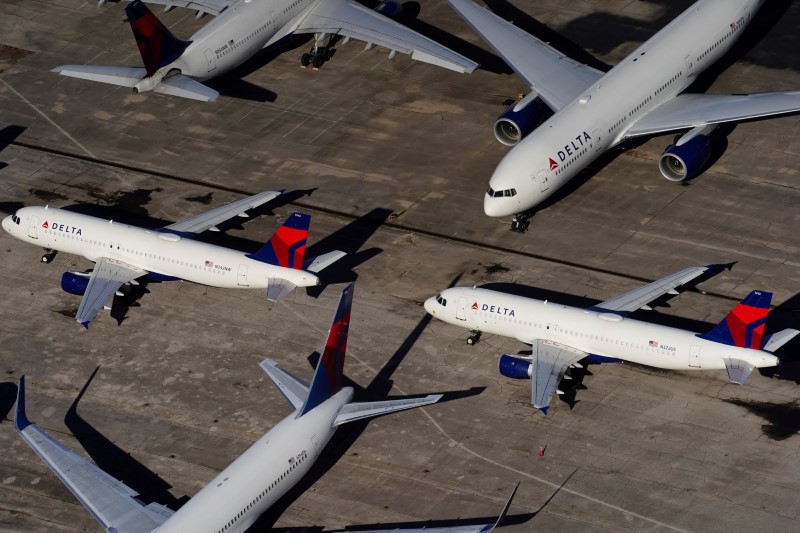By Tracy Rucinski
CHICAGO (Reuters) - Delta Air Lines (NYSE:DAL) said on Tuesday it does not expect to plug a daily cash bleed due to the COVID-19 pandemic until next spring, although it has at its disposal $1.3 billion in leftover federal aid for employees' payroll.
The airline previously said it could halt a cash bleed that averaged $18 million per day in September before the end of the year, but pushed back the target as third-quarter revenue fell 76% to $3.1 billion from a year earlier.
Atlanta-based Delta, the first U.S. airline to report third-quarter results, said it expects its cash burn to narrow to $10 million to $12 million per day in December. It was burning $27 million in cash per day in June.
The company swung to a $5.4 billion net loss, or $8.47 per share, in the quarter from a $1.5 billion profit a year ago. On an adjusted basis the loss was $3.30 per share.
Shares were down 3.7% at $31.46 in premarket trade.
The airline took a $3.1 billion charge for voluntary separation and early retirement programs as Delta slimmed its workforce as demand plunged, and a $2.2 billion fleet restructuring charge.
However, a 32% decline in labor costs in the quarter led to $1.3 billion in unspent federal funds awarded by Congress in March to cover airlines' payroll costs for six months and protect jobs.
"We've stretched those dollars out," Delta's chief executive, Ed Bastian, told Reuters, saying the company can use the money in the fourth quarter, on top of any additional aid if lawmakers finally approve another $25 billion payroll support program for U.S. airlines.
An industry push for more aid has broad bipartisan backing but is stalled amid a Washington deadlock over wider COVID-19 economic relief.
Unlike its two major rivals, Delta has avoided the furlough of flight attendants and other frontline employees after reducing work hours, but it could still furlough some 1,700 pilots on Nov. 1 without a union agreement or more federal aid, Bastian said.
Delta's flight capacity was down 63% in the third quarter and its average load factor was just 41% versus 88% a year ago, though the average yield per passenger declined only 2%.
To woo pandemic-wary passengers, the airline is blocking off middle seats through the end of the year. The policy beyond that will depend on COVID-19 testing developments, traveler surveys and continued studies on the risk of COVID-19 transmission on airplanes. Studies so far have shown the risk is "remarkably low," Bastian said.
Delta has spent hundreds of millions of dollars on efforts to restore passenger confidence, and while more people are beginning to travel, quarantines and uneven public health measures remain a deterrent, Bastian said.
He estimates business travel will recover in 12 to 24 months, though not to 100%. Delta is currently operating about 15% of its normal business travel, he said.
With no immediate need for new jets, the company has reduced purchase commitments for Airbus and Bombardier (OTC:BDRBF) aircraft by more than $2 billion this year and by more than $5 billion through 2022.

Delta ended the quarter with $21.6 billion in liquidity, after a $9 billion capital raising in September secured by its loyalty program. Adjusted net debt totaled $17 billion.